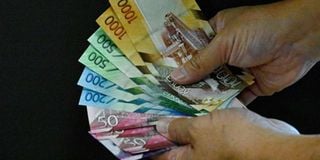Record bulk cash transfers end after campaign frenzy

The value of real-time bank transfers of more than Sh1 million dropped by Sh180 million in July .
The value of real-time bank transfers of more than Sh1 million dropped by Sh180 million in July as political campaigns drew to a close ahead of the August 9 polls, bucking a record run a month earlier.
Data from the Central Bank of Kenya (CBK) shows that transactions cleared and settled through the Kenya Electronic Payments and Settlement System and Real Time Gross Payment System (KEPSS/RTGS) dropped to Sh3.49 trillion in July down from a record Sh3.67 trillion in June.
The volume of the bulk transactions also fell 4.8 percent to 578,964 transactions in July, down from 608,173 transactions in June.
Kenyans went to the polls to elect new leaders last month after months of frenzied campaigns by politicians splashing the cash to bag coveted elective seats.
The average value for each bank transaction hit Sh6.03 million in June, which was the highest since September 2020 when it stood at Sh6.24 million.
The number of daily instructions by businesses and high-net-worth individuals to banks to transfer cash in their accounts dropped to 28,961 in June compared to 30,406 the previous month although the value of daily dealings shot up to Sh175 billion up from Sh155 billion over the same period.
CBK requires banks to strictly process and settle payments from Sh1 million through the real-time RTGS/ KEPSS system where cash reflects within four hours of getting instructions.
This enables it to scrutinise and flag suspicious or unusual transactions that may be linked to money laundering or financing of terrorism.
The high value of transactions underlines the economic recovery that has followed the lifting of Covid-19 restrictions amid a cash spending spree by politicians during their campaigns ahead of this year’s polls.
Many politicians often take out huge loans or empty their savings to fund their campaigns. The political campaign season in Kenya is traditionally marked by high expenditure on items such as helicopters and merchandise.
For example, for months the Kenyan airspace had been filled with helicopters as politicians took to whirlwind campaigns to woo voters ahead of the recently concluded elections. With their high convenience for speed and manoeuvrability, the choppers became a hotcake during the campaigns—a possible pointer to the record bulk cash movements in June.
Political groups also spent heavily on merchandise including T-shirts, aprons, caps, scarves, flyers, and posters in an attempt to woo voters through various strategies.
Kenya National Bureau of Statistics (KNBS) data underlined the strong growth of Kenya’s economy in the first quarter of 2022 by 6.8 percent compared to 2.7 percent in the first quarter of last year.
“The performance was supported by rebounds in most economic activities that had contracted significantly in the first quarter of 2021 due to measures instituted to curb the spread of Covid-19,” said KNBS.





